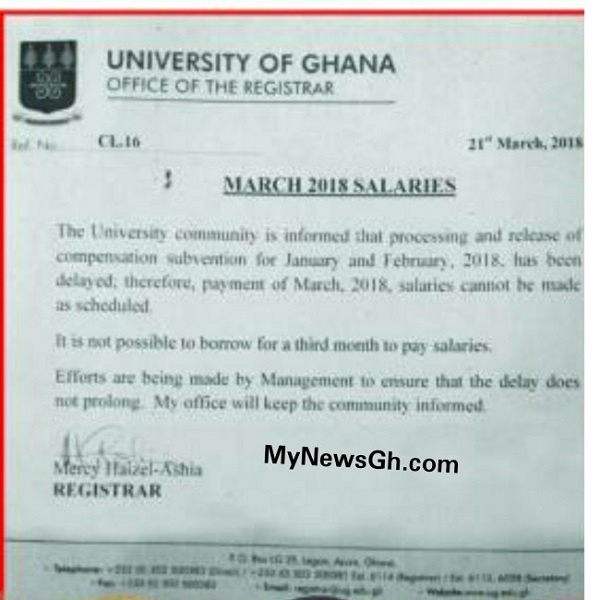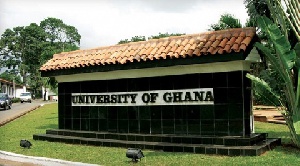The University of Ghana Management, MYNEWSGH.com can confirm is unable to pay the salaries and allowances of its staff and workers for the month of March 2018, after borrowing heavily to pay the salaries of January and February.
In a leaked memo to University staff and workers from the office of the Registrar of the University, Mercy Haizel Ashia with reference number CL.16 dated 21st March, 2018, the Registrar explained why staff should not expect salaries as scheduled for the month of March.
“The University community is informed that processing and release of all compensation subvention for January and February 2018 has been delayed, therefore, payment of March 2018 salaries cannot be made as scheduled.”, the Registrar said.
She revealed that owing to compensation subventions delays, the University cannot borrow for the third month running simply for the payment of salaries.
“It is not possible to borrow for a third month to pay salaries”, she added.
“Efforts are being made by management to ensure that the delay does not prolong. My office will keep the community informed.”
MYNEWSGH.com has earlier reported on how Central University was also running on bank overdrafts, for which reason it had to offload some of its staff in a retrenchment exercise.
In the case UG Legon, the reason, MYNEWSGH.com’s sources say it is as a result of government’s inability to pay the university its compensation subvention out which it pays the numerous University staff members and workers.

UG to be privatized
Readers will recall the Minister of State in charge of Tertiary Education, Professor Kwesi Yankah, saying the government is committed to ensuring that the University of Ghana is not privatized over its financial issues.
Prof Yankah’s comments followed after the Education Minister, Dr. Matthew Opoku Prempeh, revealed that the premier university might soon be privatized if it fails to meet its obligations in a $64 million agreement it entered into with a private company, Africa Integras.
“The University of Ghana might be put up for sale because it entered into an agreement and the school is unable to abide by the terms and conditions of the contract. Under this contract, Legon is expected to pay 10 million dollars every year for 25 years. If Legon is unable to settle this loan, its assets will be seized,” the Minister had stated.
But Prof Yankah had discounted that fear.
“It is our prime university, the number one university in the country – probably the number one in West Africa…Fortunately, there appears to be a resolution in the offing. Parties are talking as we speak now and there appears to a resolution in one form or the other. We will do anything possible to save the University. We will not just sit and allow the University to collapse.”, he said.
Africa Integras $64m deal in UG’s interest
Former Vice Chancellor of UG, Prof Aryeetey has been accused of ‘selling’ the University by signing an agreement without any due diligence.
He, however, rubbished these claims, explaining that UG had gone through all the right procedures before signing the agreement with the company. He took his turn on Ghanaweb’s 21 Minutes with KKB to explain his side.
Professor Aryeetey insisted the processes leading up to the signing of the agreement with Integras were transparent, with all relevant stakeholders being kept informed of all developments.
“There is no scandal at all in relation to the $64.4 million contract. Africa Integras signed an agreement that they were supposed to spend that money. As far as I know, by the time the project stopped, they had spent about $28 million. How does a phoney company come and spend $28 million? You can see the buildings coming up and yet it has been written that I have signed an agreement with a phoney company. We haven’t spent any money ourselves, it’s the ‘phony’ company that’s spending the money; how does a phoney company put up buildings?,” Professor Aryeetey asked.
He also dismissed assertions that he had received financial inducements to allow the project to proceed.
The project was structured as a 25-year Build, Operate and Transfer (BOT) contract.
General News of Friday, 23 March 2018
Source: mynewsgh.com

















